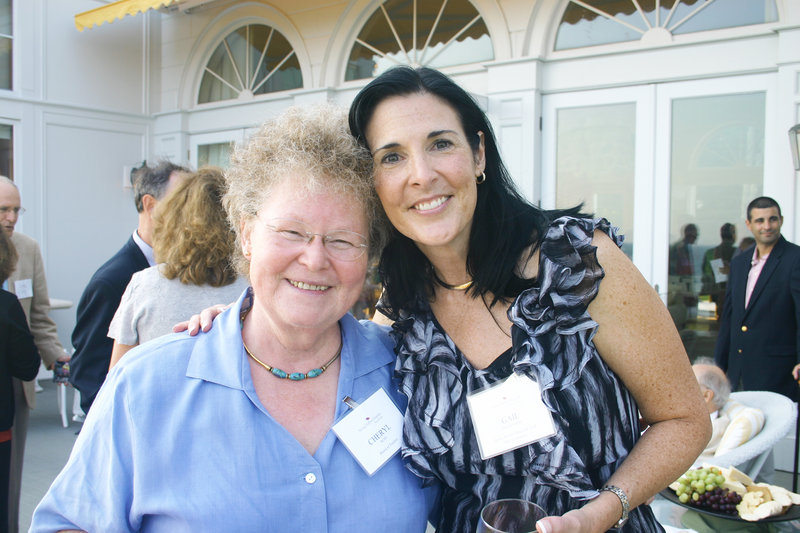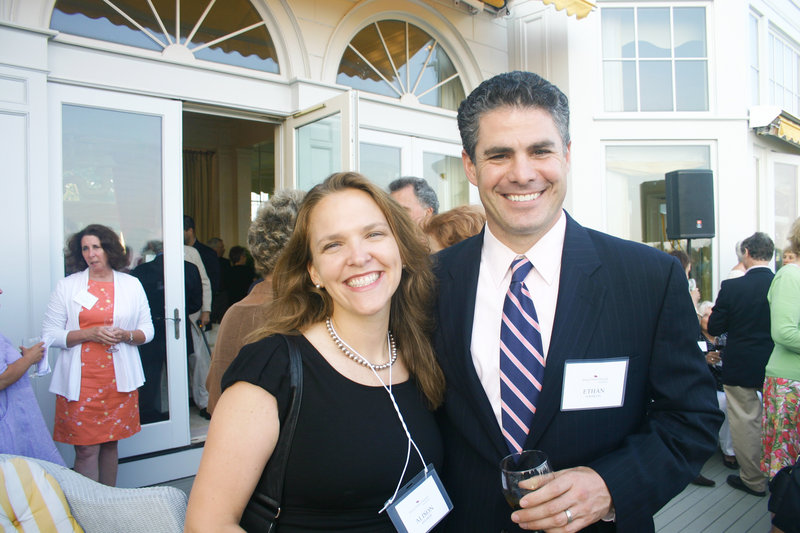It takes profound courage to reveal your family’s painful history, particularly when you have one of the most famous pedigrees in America. Milly Monks, who is the great-granddaughter of Thomas Carnegie and great-grandniece of Andrew Carnegie, displayed such intrepidity in publishing her memoir “Songs of Three Islands: A Story of Mental Illness in an Iconic American Family.”
On Wednesday evening at their lovely oceanfront estate in Cape Elizabeth, Milly and Robert Monks welcomed more than 200 guests to the Signs of Hope party benefiting Spring Harbor Hospital, the area’s cutting-edge provider of in-patient mental health services, and celebrating the U.S. publication of the book.
Despite her high-profile heritage, Milly’s life has not been one of carefree comfort. Rather, it has been marked by the mental health struggles of her mother and daughter. This is the world chronicled in her book, which is at turns heart-rending and poetic, as it mixes the intensely personal with the trappings of great wealth. Her prose is alluring and approachable, weaving a story of pain, shame, guilt and, ultimately, love.
“We need to learn to share with each other the problems and suffering around mental illness,” Milly told her guests. “We need mothers to speak out in a community of support.”
At the close of Milly’s remarks, Sheri Boulos, chair of Spring Harbor’s development committee, presented her with a Simon Pearce vase as a token of the board’s appreciation for her hosting the party and her work to educate the public about these important issues.
But even more significant was Boulos’ announcement that the hospital intends to create support groups for those affected by mental illness.
During the party, where Monks’ family friend Nell Britton sang and played the piano and Churchill Catered Events passed hors d’oeuvres, I had the chance to chat with a number of Spring Harbor supporters. These included Spring Harbor trustees Cheryl Rust, Lester Hodgdon and Rich Petersen, who is the president and CEO of Maine Medical Center.
Others I had the pleasure of speaking with included Meg Baxter, founding board chair of Spring Harbor; Dr. Girard Robinson, Spring Harbor’s chief medical officer; Ric Marshall, the Monks’ former son-in-law; Dr. Jim Maier, who heads the PIER Program; Mary Jane Krebs, chief clinical and nursing officer at Spring Harbor, Dr. Susan Schraft, who practices at Central Maine Medical Center; and Eugenia O’Brien, executive director of Portland Ballet.
Both Al and Judy Glickman were also at the party. Known for their support of many local causes, the Glickmans gave Spring Harbor $1 million a few years back to support the building of the new hospital, the establishment of the director of adolescent and child psychiatry position, and the funding of an annual symposium.
As I circulated among the guests, one common topic of conversation was the skyrocketing interest in local food and plant-based cuisine. Host committee member Sidney Hodgdon of Brunswick and I chatted about our state’s fabulous farmers markets, and master preserver Beth Richardson and I talked about the recent uptick in interest in home canning.
Since recent research has shown that diet can reduce the risk of Alzheimer’s disease and dementia, and a growing number of mothers of children with autism spectrum disorders are finding success with a gluten-free, dairy-free diet, I wasn’t surprised to find this crowd so tuned into food.
Before Milly spoke, Spring Harbor CEO Dennis King thanked everyone for attending.
“Can you imagine feeling ashamed for having cancer?” King asked the group.
The answer is of course not, but the same cannot be said for those afflicted with psychiatric illnesses.
Boulos picked up on this theme when she said, “We easily tell each other when we have joint pain or need bypass surgery, but we hesitate when there’s something wrong with our or a loved one’s brain.”
Could change be on the way? As the sun set, we all left with the hope that the bravery displayed in Milly’s book will inspire others to speak about mental illness in the same way we talk of physical disease. Our brains shouldn’t be treated differently than our hearts.
Send questions/comments to the editors.






Success. Please wait for the page to reload. If the page does not reload within 5 seconds, please refresh the page.
Enter your email and password to access comments.
Hi, to comment on stories you must . This profile is in addition to your subscription and website login.
Already have a commenting profile? .
Invalid username/password.
Please check your email to confirm and complete your registration.
Only subscribers are eligible to post comments. Please subscribe or login first for digital access. Here’s why.
Use the form below to reset your password. When you've submitted your account email, we will send an email with a reset code.